On Wednesday, April 4, 2018, eight new Barbour Scholars joined a community of women from all over the world dedicated to international education and innovation. These students, their advisors, and local Barbour alumnae gathered over lunch to meet one another and share their educational endeavors. The Barbour Scholarship has a long-standing tradition of gathering as a community over tea, meals, or social events, one that started with some of the earliest cohorts in the 1900s.
The 2018-2019 school year begins the second century of commemorating Levi Barbour’s legacy of global engagement and opportunity at the University of Michigan. Like previous Barbour cohorts, this group of women brings a variety of backgrounds, experiences, and research interests to the table, tackling challenges relevant to today’s society such as those relating to mental health, environmental issues, and medical phenomena at the cellular level, just to name a few.
The Rackham Graduate School is proud to welcome the following students into the prestigious Barbour community:
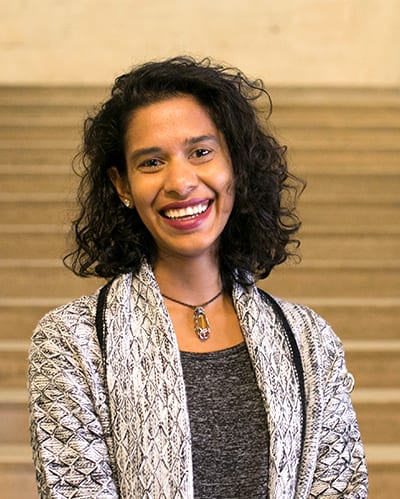
Vishnupriya Das
Vishnupriya Das (India) is a Ph.D. Candidate in Communication Studies studying the experiences of digital intimacy in India. In her dissertation she explores how young urban Indians experience intimacy across geographic distance through communication technologies such as mobile phones, social media, and wearables. In addition, she analyzes how mobile app companies (social media, instant messaging, and dating platforms) imagine and mobilize the idea of “intimacy” in their development, design, and production practices. Taking this intersection of usage and production of mobile digital cultures in urban India as an entry point, she investigates how notions of citizenship and gender become intertwined with everyday experiences of connection across geographic distance.
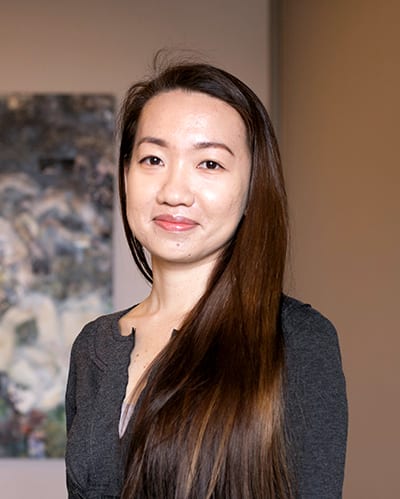
Yuanqiu Feng
Yuanqiu Feng (Singapore) is a Ph.D. Student in Natural Resources and Environment studying how socio-cultural perceptions of water may limit or create opportunities for managing stormwater. Managing excess water while ensuring safe and adequate water supplies are mounting challenges for cities in an era of climate change. New urban drainage approaches such as green or smart stormwater infrastructure present promising solutions, but entail perceptible changes in how water behaves in the landscape that may pose cultural barriers to their widespread adoption. Better understanding of cultural perceptions can help inform urban drainage adaptation strategies and identify inroads for developing hydrologically-responsive open space typologies that may increase urban resilience to more extreme hydrologic regimes.
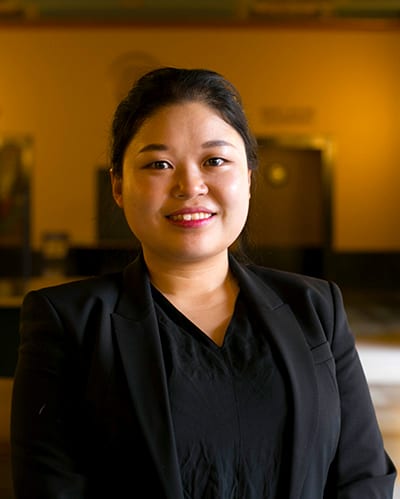
Jiseung Kim
Jiseung Kim (Republic of Korea) is a Ph.D. Candidate in Linguistics. Her dissertation is grounded in the understanding that individual speakers differ systematically from each other in how they convey prosodic structure. A series of three experiments is being conducted to investigate (1) how speakers of American English assign relative weights to the different primary cues marking the phrasal boundary, and (2) whether these individual patterns are mirrored in how these same speakers attend to these cues for phrasal organization. Answering these questions would offer crucial insights on how speakers and listeners, despite individual differences, agree on the abstract representation that signals a linguistic contrast, and consequently achieve successful communication.
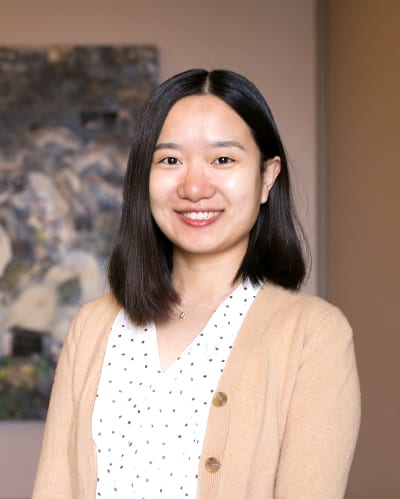
Dan Li
Dan Li (China) is a Ph.D. Candidate in Pharmaceutical Sciences studying the development of synthetic high density lipoprotein (sHDL) based nanoparticles for atherosclerosis therapy. sHDL is reported to be able to reduce the risk of cardiovascular disease through reverse cholesterol transport process (RCT). However, the short circulation time limits its application in clinics. To prolong the retention time in serum, sHDL particles were modified with PEG polymer. The micelles system was also established to mimic the structure and function of sHDL and investigated for its efficacy in preventing atherosclerosis. The formed sHDL-PEG or micelles nanoparticles achieved more potent cholesterol efflux effect and potential better therapeutic effect.
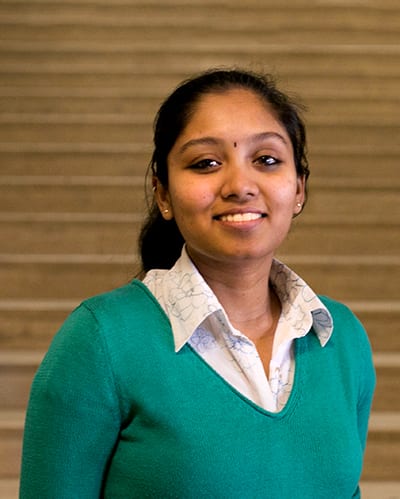
Shyama Nandakumar
Shyama Nandakumar (India) is a Ph.D. Candidate in Molecular, Cellular, and Developmental Biology. She is using the fruit fly as a model organism to study when and how cells in the brain stop dividing during development, and what happens when the non-dividing or postmitotic state of cells in the brain becomes compromised with age. This work is important because a compromised postmitotic state that sometimes occurs with age can lead to disease states such as cancer and neurodegeneration. She is also passionate about teaching college-level biology. She hopes to return to India after conducting postdoctoral research to teach biology at a university. Her ultimate goal is to contribute to the development of basic research institutes in India.
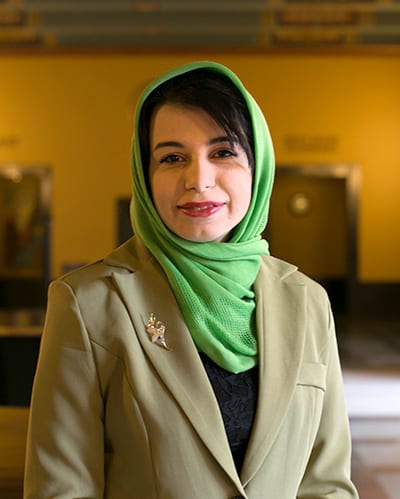
Hanieh Safari
Hanieh Safari (Islamic Republic of Iran) is a Ph.D. Candidate in Chemical Engineering studying the development of novel vascular-targeted drug delivery systems for treatment of cardiovascular disease. Biodegradable synthetic polymeric particles can be utilized to target diseased sites via specific binding to disease-associated markers expressed on the blood vessel wall. This approach helps to minimize the side effects of the drugs while improving their efficacy. She studies the interaction of blood hemodynamics with polymeric particles looking into the methods of altering particle properties to enhance their localized binding performance. She looks forward to contributing to the improvement of the treatment status of cardiovascular disease all across the world.
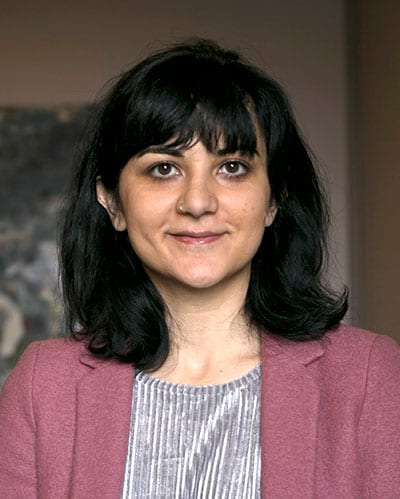
Kevser Pinar Ustel
Kevser Pinar Üstel (Turkey) is a Ph.D. Candidate in Social Work and Sociology studying new forms of expertise and knowledge-making in the field of mental health. The introduction of new technologies into this field reconfigures established modes of relationship between those who seek support and those who provide it. These tools challenge therapeutic temporalities by providing fast-paced support, and they generate new forms of data. Focusing on digital interventions such as therapy bots or mental health apps that proliferate within a context of scarce public resources, her research explores how the ecology of this field is changing.
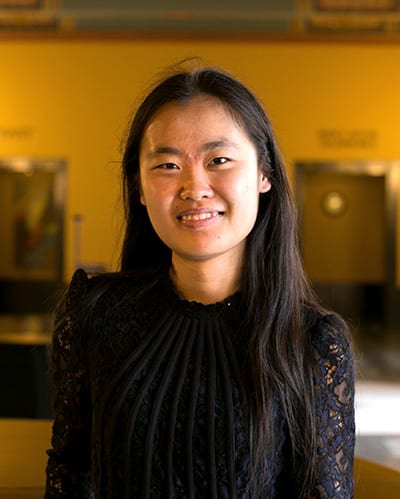
Yi Wang
Yi Wang (China) is a Ph.D. Candidate in Earth and Environmental Sciences researching deoxygenation in the ocean, particularly in Oxygen Minimum Zones (OMZ) where dissolved oxygen becomes so low that it can devastate marine ecosystems and create ‘Dead Zones’ for fisheries. Both climate change and human activities are projected to aggravate deoxygenation, and yet direct observations of OMZs are usually compromised by sparse sampling both spatially and temporally. To extend OMZ records and capture long-term variabilities for better OMZ projections in a warming world, she is using marine sediment records to reconstruct past oxygen changes and identify the underlying driving forces.

